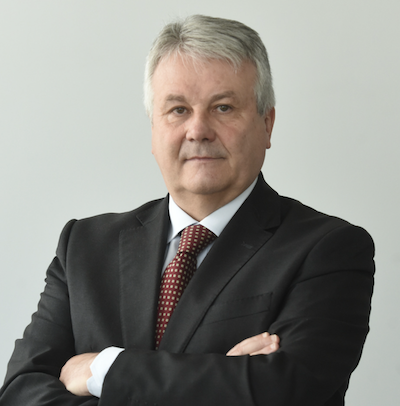Digital transformation is not a linear journey. It is a process characterized by growing complexity that involves infrastructure, applications, data, security, and services. And these are also the starting points for the discussion with Antonio Burinato, General Manager, and Sergio Ajani, Service Solutions Design Director at Innovaway. The company positions itself as a digital solution provider and integrator— "service and solution provider, yes, but also a system integrator", introduces Burinato—capable of governing the client's entire technological ecosystem, ensuring operational oversight and innovation capacity. "The point today is no longer adopting new technologies, but continuously governing their complexity," he continues, effectively summarizing the common challenge faced by businesses and public administrations:"The partner's role becomes that of ensuring the necessary support to keep the IT ecosystem coherent, secure, updated e and aligned with the client's strategic priorities."
The market, in fact, does not ask for simple technical skills, but for partners who are present during critical moments, capable of anticipating critical issues, operating on heterogeneous infrastructures, fragmented workflows, stringent regulations, and an exponential increase in the demand for automation and AI.
Competitive and regulatory pressure is particularly evident in the most mature sectors, such as finance, utilities, retail, and central and regional Public Administration (PA).
Innovaway has been working for years on projects of high complexity and scale: from managed services for Intesa Sanpaolo (and IsyBank) to service management for Rinascente, and activities for Lombardy Region, INPS, Universities, regional bodies, and healthcare companies, which we discuss next. These are distributed digital ecosystems, with thousands of users, stringent SLAs, 24/7 environments, and reliability levels typical of mission-critical processes. It is in these contexts that the value of combining proximity, continuity, and a culture of service with a structured industrial model emerges. In this scenario, the identity of Innovaway emerges: a company with over 25 years of experience, 800 professionals (offices in Naples, Benevento, Milan, Rome, and Turin), an expected 2025 turnover of around 60 million euros, with an indicative growth of 10% compared to the previous year (52 million in 2024), international offices, and "a deep-rooted culture of service, which represents the true distinctive feature of its relationship with the market."
The culture of service, indeed. We are therefore talking about a kind of "extended accountability, which defines the way of working, internal organization, and the relationship with technology partners."

This point is complemented by the vision of Sergio Ajani, who emphasizes that IT efficiency avoids improvisation: "The solution lifecycle can no longer be broken up today. The person who designs must be the same one who manages and evolves, because that is the only way to create coherence." This approach eliminates back-and-forth, reduces the complexity perceived by clients, and simultaneously allows for the development of a deep knowledge of infrastructures, processes, and evolutionary needs. This results in a relationship of trust that, in the case of large finance, retail, industrial, and public clients, translates into high-intensity, multi-year contracts.
These are also the ingredients underpinning the financial results, illustrated by Antonio Burinato, which portray a company with "a clear value proposition," solid growth, and a strategy clearly oriented towards scalability and sustainability. "This growth we have achieved is significant, but most importantly, it is healthy." Burinato highlights that it is not episodic, but structural: "And the new multi-year contracts signed in 2024 also bring stable growth." A significant part comes from the end-to-end services provided in the areas of Enterprise Service Management, IT Operations, Application Maintenance, and high-value BPO, areas in which Innovaway has consolidated a mature model over the years, "which is now called to grow further based on the industrial plan developed for the three-year period, in an IT scenario that is still highly fragmented".
Italy presents itself as a dynamic market, with lively demand from central PA, digital healthcare, finance, and retail. Ajani adds a reflection on competitive positioning: "We are not focused on a single sector. Our strength is serving different clients with the same capacity for governance and continuity."Overall, Innovaway faces 2025 with a robust financial structure, an expanded order book, and a commercial pipeline that reflects the growing client confidence in its end-to-end model.
Innovaway does not limit itself to providing technologies; it builds a governance model for transformation first, and then for the ability to leverage digital, overseeing the entire solution lifecycle.

As Sergio Ajani points out, "service coherence is what makes the difference: you can have the best technology, but if you don't manage a structure that guarantees continuity and execution, you won't get far." This approach is evident in the large contracts managed by the company. Burinato cites the example of Intesa Sanpaolo, where Innovaway operates with an integrated model that includes application support and unified governance of service levels. "With Intesa, we operate not as a supplier, but as a piece of their operational machine," he states.
The same logic is found in the projects for INPS, where Innovaway contributes to the management of complex services such as pensions with extremely high volumes, and in the contracts for the Lombardy Region (among other projects, securing healthcare system backups with Rubrik), which require constant oversight of critical environments and the capacity to manage peak demands. Furthermore, in healthcare, the company is involved in digitalization projects that include remote assistance, management of clinical platforms, and support for territorial ecosystems (including ARIA in Lombardy). In retail, it is a strategic partner for Rinascente, with an operational model that integrates omnichannel support, point-of-sale assistance, and application governance. In the university and research sector, the company manages advanced services for universities and foundations, ensuring 24/7 continuity. The operational model is enabled by an organization with a presence abroad as well (a total of about 800 people, including Italy) which allows for multi-language service delivery from Albania, Bulgaria, and has taken up the challenge of growing in the United States too. This cross-country capability allows for the management of global contracts with differentiated SLAs and continuous availability. As Ajani summarizes: "Our go-to-market stems from the consistency of the service. When the client sees that we are always present, even during the most complicated hours, then it becomes a true partnership."
In the discussion with Innovaway, an integrated vision of innovation that combines security, cloud, automation, and artificial intelligence strongly emerges. Burinato insists on a fundamental point: "Today, no IT project starts without a risk assessment: cybersecurity and data protection have become prerequisites, not optional components." An approach that derives from field experience and the growing exposure of organizations to threats, incidents, and vulnerabilities stemming from distributed ecosystems, hybrid infrastructures, and heterogeneous applications. Sergio Ajani also intervenes decisively on this topic, highlighting that fragmentation is one of the main problems: "The client sees different environments, different tools, different suppliers. And when there is an incident, they don't want technical explanations: they want someone to take responsibility for the entire service." Cybersecurity, for Ajani, is therefore not just a matter of technology, but of operational governance, capacity to react, and an end-to-end service model.The second axis of innovation is the cloud. Burinato specifies that "the cloud must not be a dogma: it must be governed. Without control, there is a risk of increasing complexity, not reducing it." Ajani also reinforces this concept: Cloud, on-premise, hybrid: what matters is having a single, constant line of governance that maintains coherence and service quality." And Innovaway approaches the topic agnostically, respecting client choices—but also guiding them—and based on a "hybrid" strategic proposal for multi-cloud management that integrates public, private, and hybrid services with constant oversight of service levels, costs, and processes.
The most substantial chapter, however, concerns artificial intelligence. Burinato defines it as "the next level of automation, beyond the hype," but warns: "Generative AI is only the first step. The real paradigm shift will come with Agentic AI, capable of executing tasks and orchestrating complex workflows." Ajani confirms: "When AI is not limited to answering, but acts and proposes solutions, then it becomes a value multiplier. This requires specifically modulating the use of AI to the real needs of companies, keeping in mind the non-deterministic nature of AI," also through the verticalization of large language models, for specific contexts, starting from the open-source proposal. This vision of Innovaway regarding the valorization of technologies is realized through strategic technological partnerships "and the one with HclSoftware is the most evident, based on the capacity to bring the native AI of Hcl platforms into the clients' real processes," comments Burinato, following the recent recognition as Europe Managed Service Provider Partner of the year. But the ecosystem is extensive nonetheless: cloud providers, cybersecurity vendors, automation solutions, and ITSM platforms compose a mosaic that Innovaway integrates into a single service logic. A shared awareness emerges from Burinato and Ajani: digital transformation is not a cycle that closes, but a path that requires continuity, discipline, and the capacity for adaptation, bringing us back to the starting point reflections. Burinato summarizes it in one sentence"What we did three years ago is no longer enough today, and in three years it will be different again. Digital is not a project; it is a continuous journey." It is a vision that is reflected in the way Innovaway builds its relationships with businesses and the PA. This is why Ajani insists on the need for a long-term perspective. The message is clear: continuity is what transforms a supplier into a strategic entity, capable of accompanying organizations through the increasing complexity of digital systems.